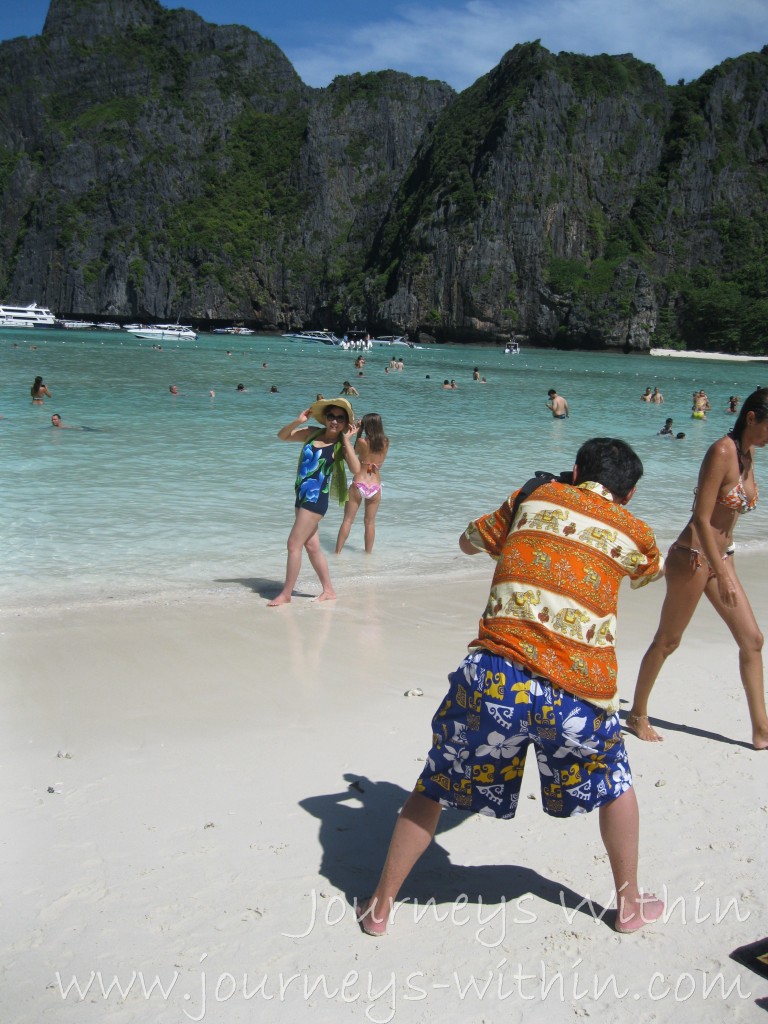Here at Journeys Within, we strive to support sustainable tourism, an industry the United Nations Environmental Program has recognized as a key economic sector that can help countries, established and developing, transition to a greener economy…
The hit Hollywood film The Beach has dramatically increased tourism to Koh Phi Phi and surrounding islands — this influx of tourists has taken its toll on the natural environment.In a report released earlier this month, the environmental arm of the United Nations recognized the positive role that tourism can play in a green future. With tourism on the rise globally the paper notes that tourism is one way for developing countries to join the global economy while protecting natural resources. Seeing the largest worldwide increase — there is an average 10% rise in international visitors each year — Southeast Asia needs to take notes of how to develop tourism sustainable.
Not unrealistic, the paper acknowledges possible negative impacts of that come from tourism. Increased waste, pollution stemming from transportation, an increase in water consumption, loss of cultural identity and an increase in conflicts with indigenous populations can all have long-term effects on the local environment.
However, more importantly the report goes on to outline how governments can use the power of tourism to help create long-lasting employment opportunities; because of the size and reach of the sector, this is a critical element of transitioning to a green economy. It goes on to outline, in theory, how long-term sustainability, environmental and otherwise, comes from a careful and delicate balance of social, economic and environmental issues.
According to the UN sustainable tourism should:
1. Make optimal use of environmental resources that constitute a key element in tourism development, maintaining essential ecological processes and helping to conserve natural heritage and biodiversity.
2. Respect the socio-cultural authenticity of host communities, conserve their built and living cultural heritage and traditional values, and contribute to inter-cultural understanding and tolerance.
3. Ensure viable, long-term economic operations, providing socio-economic benefits to all stakeholders that are fairly distributed, including stable employment and income-earning opportunities and social services to host communities, and contributing to poverty alleviation.
Sustainable tourism development requires the informed participation of all relevant stakeholders, as well as strong political leadership to ensure wide participation and consensus building.
Sustainable tourism should also maintain a high level of tourist satisfaction and ensure a meaningful experience to the tourists, raising their awareness about sustainability issues and promoting sustainable tourism practices among them.
While this balancing act is no small feat, the fact that tourism is being discussed on the world stage in the same breath as environmental sustainability demonstrates a shifting paradigm in how the world thinks about travel.
Countries like Cambodia, Laos and most recently Myanmar are all anxious to make their mark in the global stage and each has a tourism plan to help them achieve this. These countries recognize that the tourism sector, one that is rapidly ballooning, is one of the fastest ways to grow the amount of money coming into the country — both in terms of investments and direct tourism spending.
The short-term the play to attract as many people as possible as quickly as possible may work, the mass influx combined without proper planning will have devastating long-term effects on the countries. This latest report provides planning tools to mediate some these effects.
By including tourism as one of the sectors that can help economies develop, the UN is contributing to a conversation that conscientious tourism businesses have been involved with for some time; mainly how can we ensure that our guests get a great travel experience while also benefiting the communities.
Here at Journeys Within, we believe that taking the time to choose vendors that make an effort to be environmentally, socially and cultural responsible, as well as educating our guests about the regions they visit. Support for programs that create sustainable opportunities in tourism can help ensure that there is a brighter and greener future for everyone.






Great tourism article and very informing. Thanks for sharing